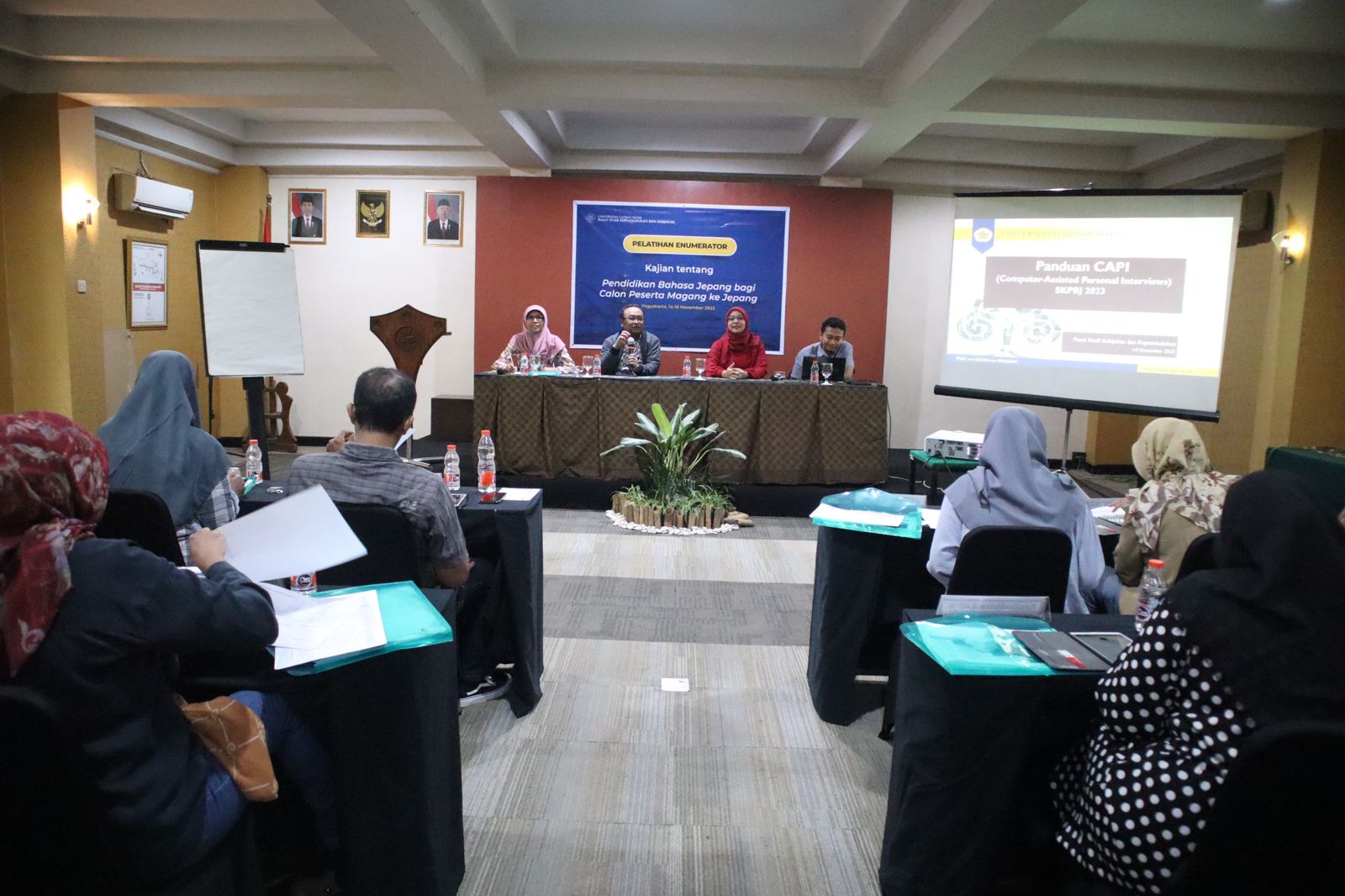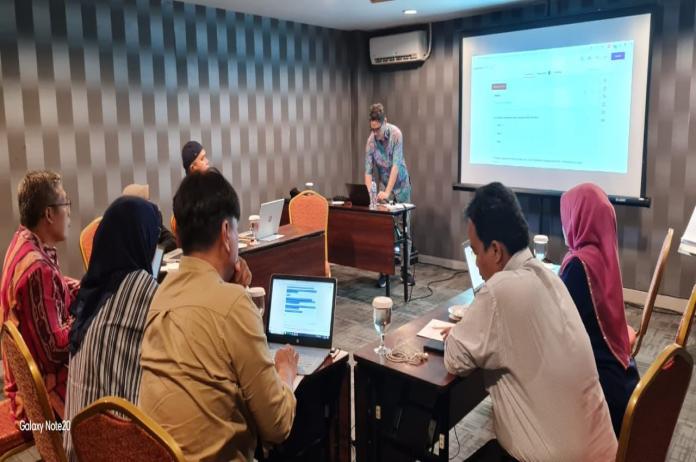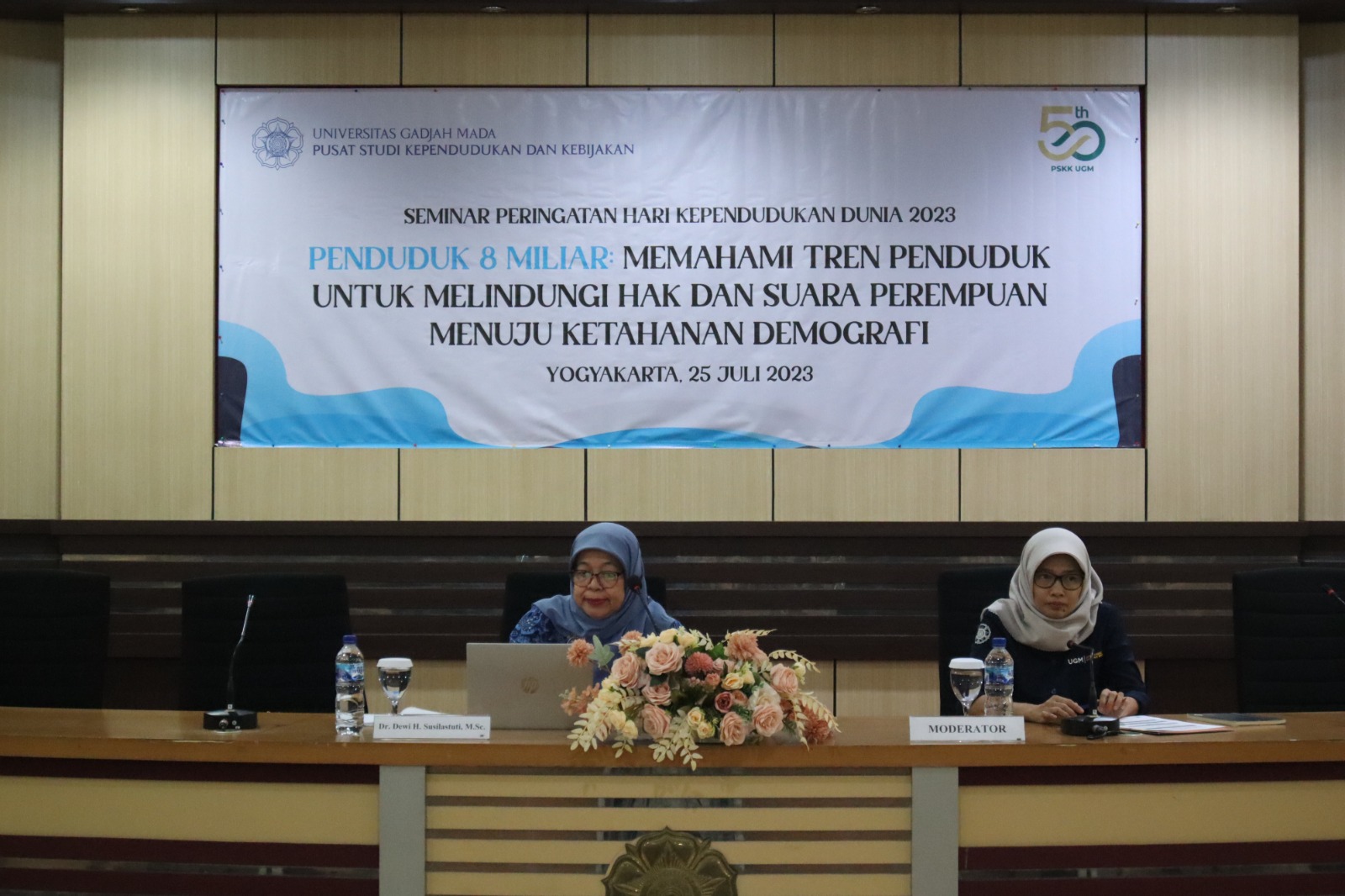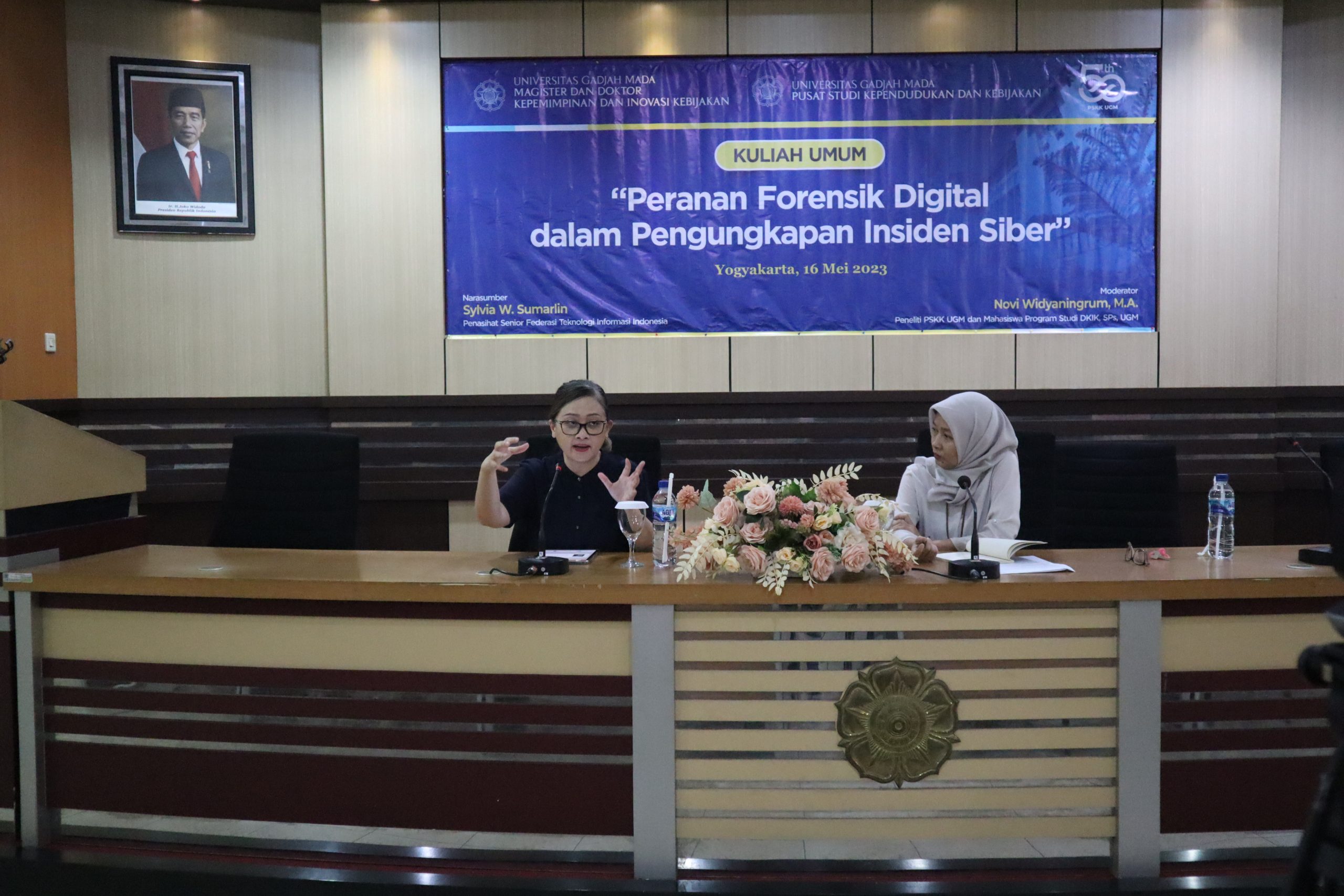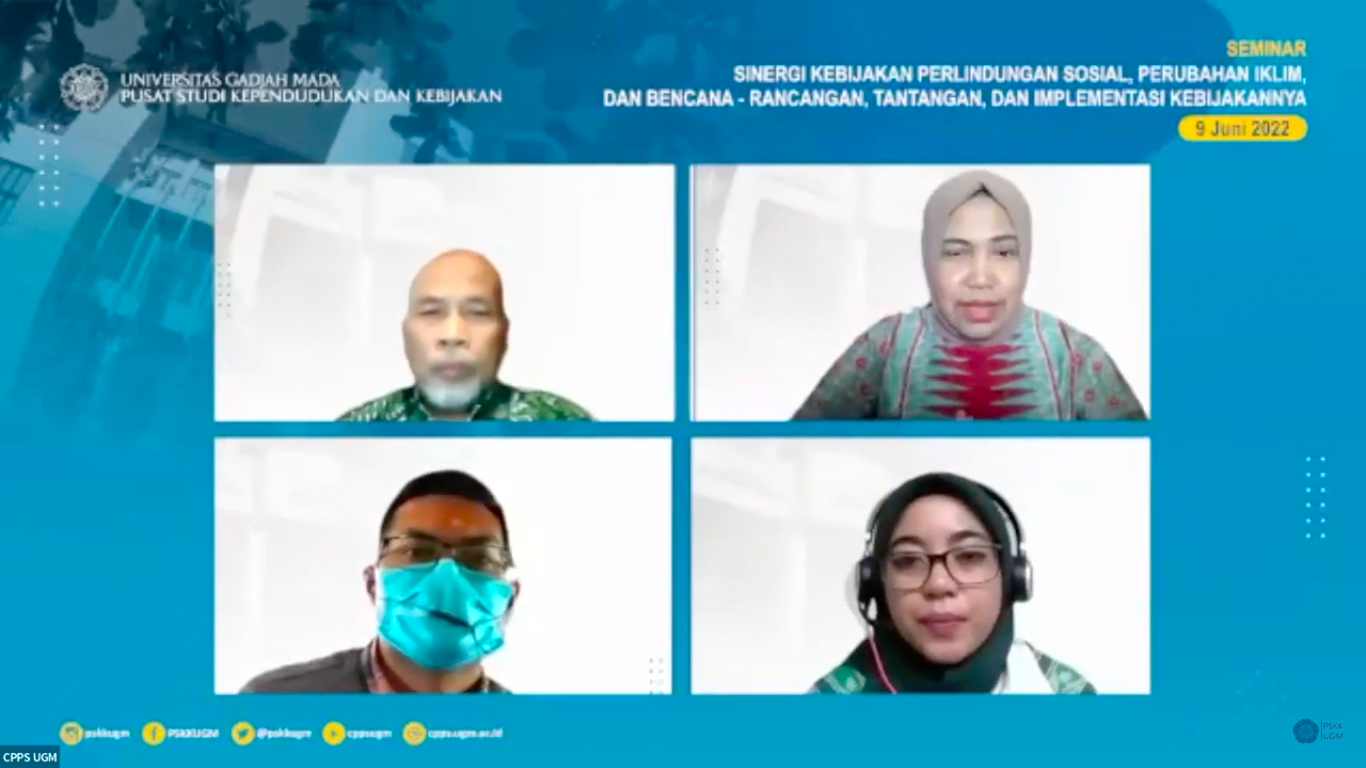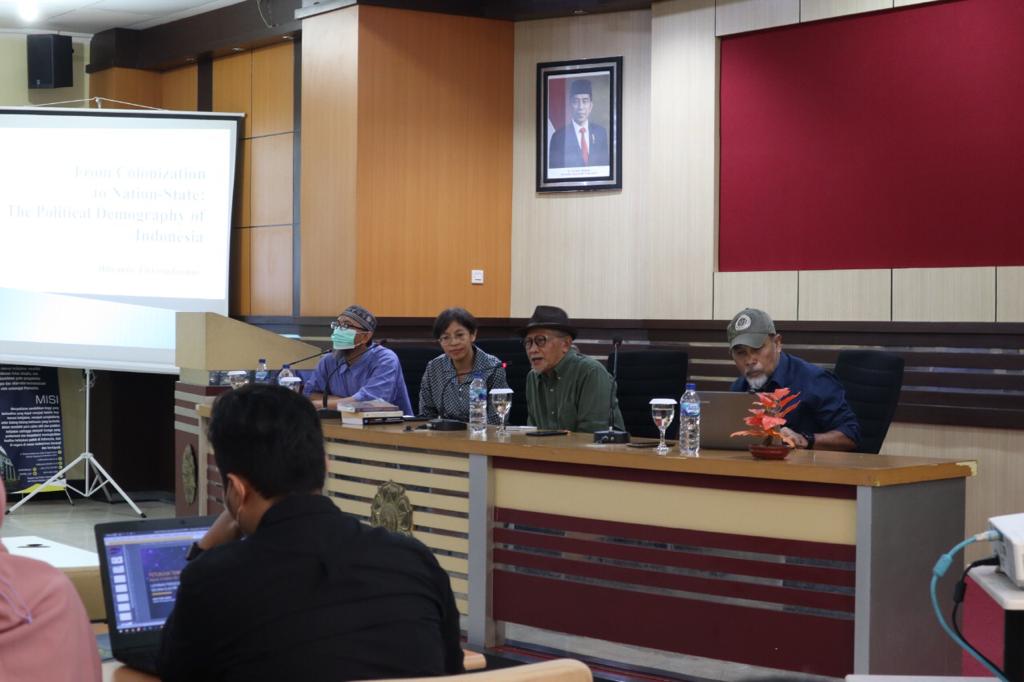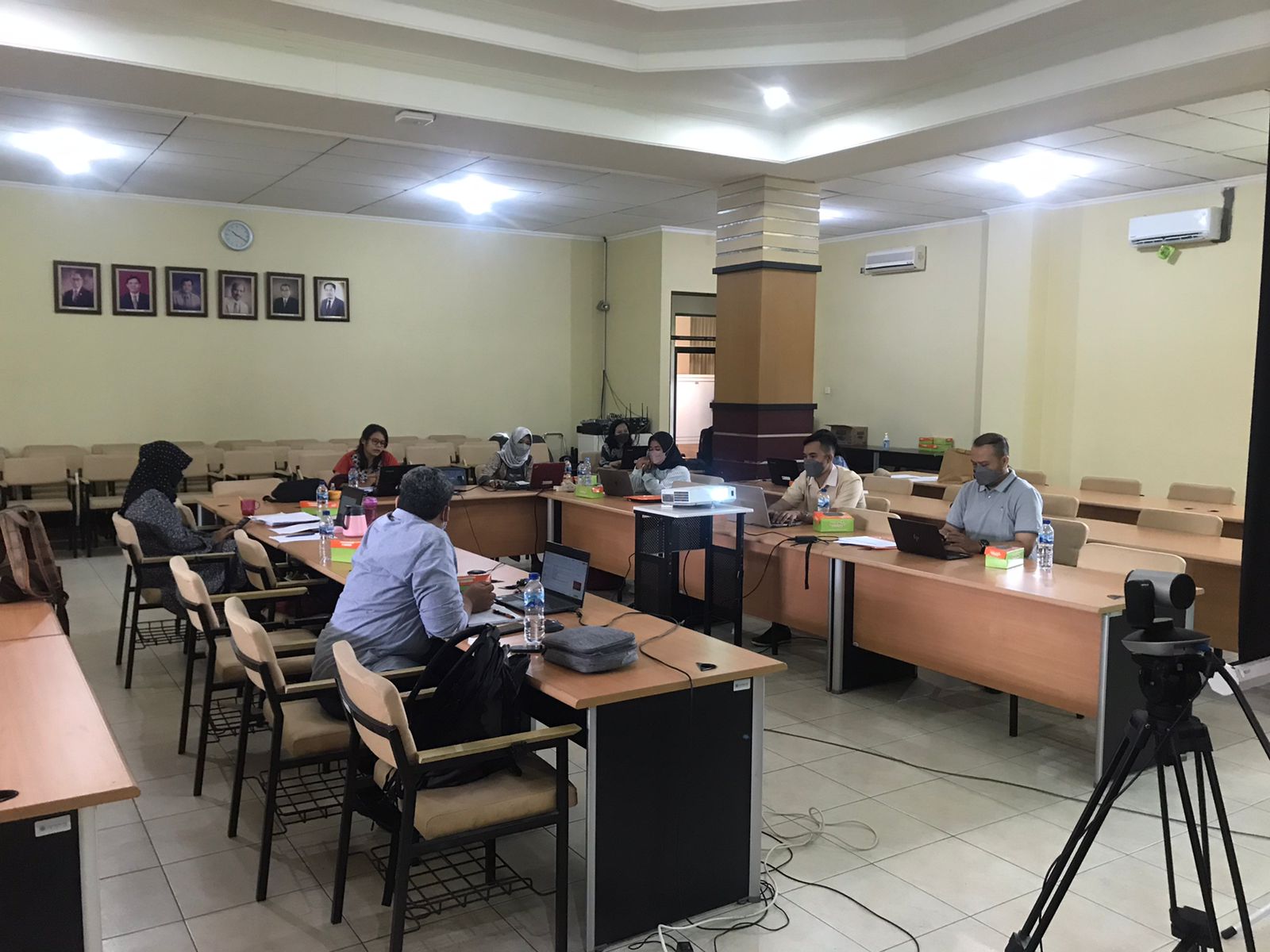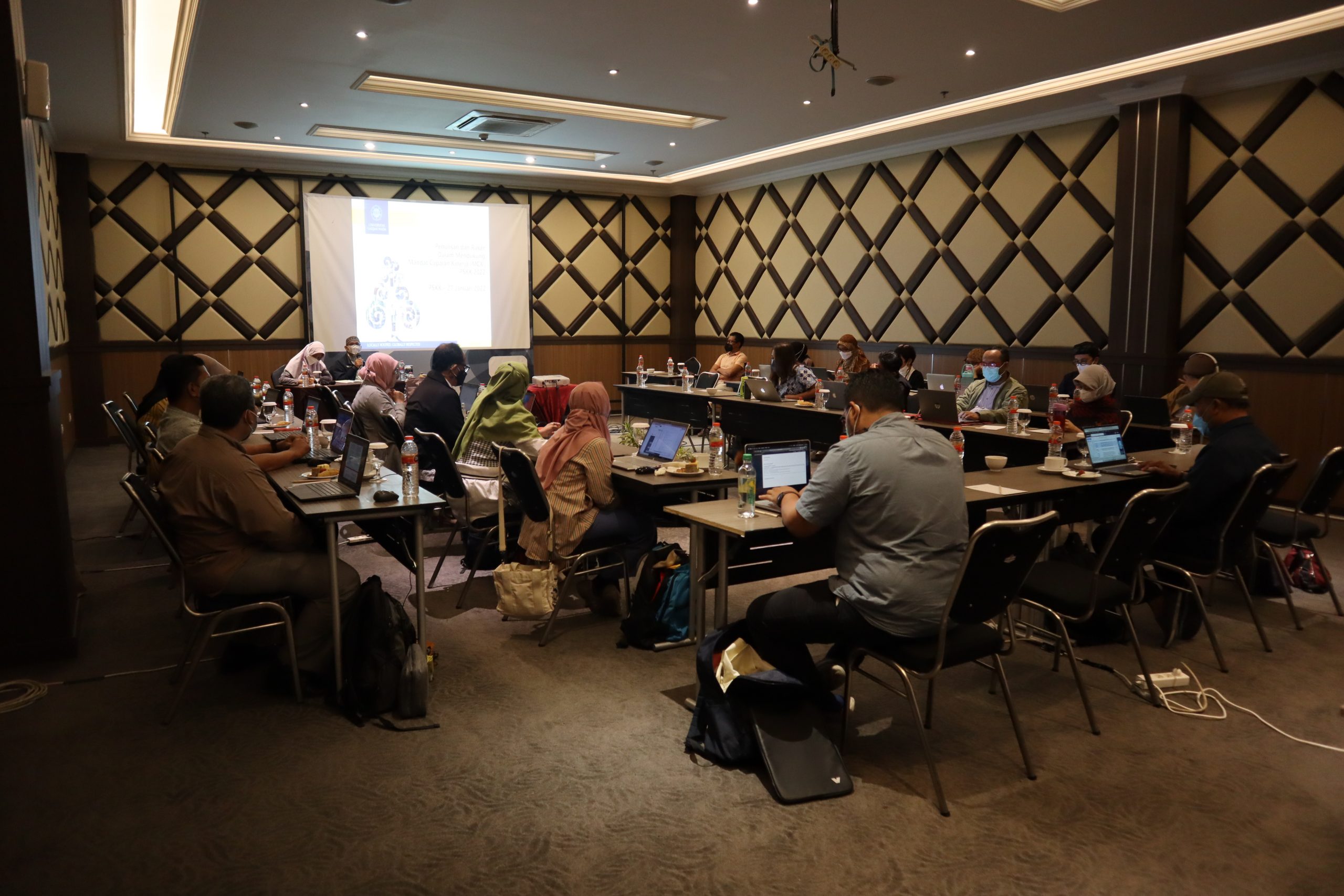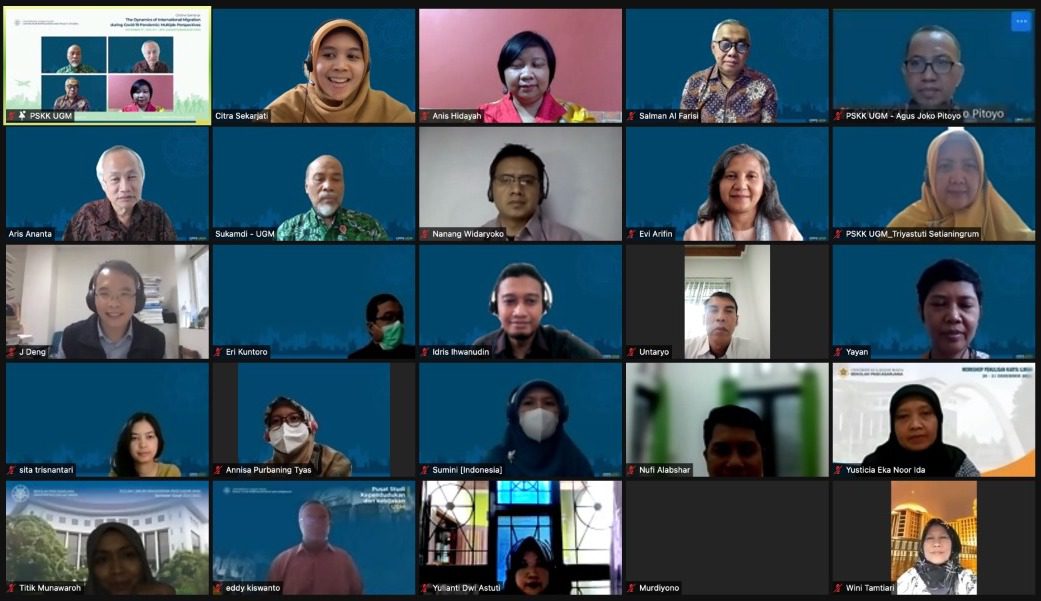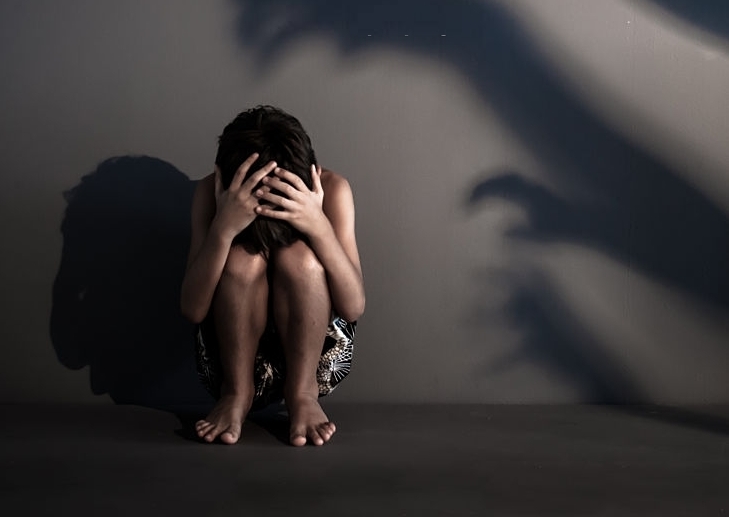Yogyakarta – Center for Population and Policy Studies (CPPS) UGM in collaboration with the Japan International Cooperation Agency (JICA) conducted a study regarding the Japanese language training system for internship and/or work programs in Japan for Indonesian citizens.
Press Release
PSKK UGM – Education and Training Center for Educational and Religious Technical Personnel sent a team to study Monitoring, Evaluation and Learning techniques at the Center for Population and Policy Studies Gadjah Mada University (CPPS UGM) Yogyakarta.
Yogyakarta – In commemoration of World Population Day 2023, the UGM Center for Population and Policy Studies (CPPS) held a seminar with the theme “A Population of 8 Billion: Understanding Population Trends to Understand Women’s Rights and Voices Towards Demographic Resilience”.
The seminar took place in the Prof. Auditorium Building.
CPPS UGM – MDKIK SPs UGM in collaboration with CPPS UGM successfully held a public lecture entitled “The Role of Digital Forensics in Disclosure of Cyber Incidents” on Tuesday, 16 May 2023.
Sylvia W.
CPPS UGM – Over the last five years, Indonesia has been entering an important policy momentum related to climate change, disaster management, and social protection.
The government has developed a new approach for solving the socio-economic problems caused by climate change and disasters by using a social protection scheme called the Adaptive Social Protection (PSA) policy.
To support the government in developing the PSA policy in Indonesia, the Center for Population and Policy Studies (CPPS) Universitas Gadjah Mada (UGM) held a workshop on Thursday, 9 June 2022.
The workshop was run under the theme, “The Synergy among Social Protection, Climate Change, and Disaster Policies – Policy Design, Challenges, and Its Implementation” by inviting some experts in PSA policy.
The CPPS UGM held the workshop to facilitate a meeting among academics, policymakers, and international institutions to formulate accurate strategies to realize the PSA policy in Indonesia.
On this special occasion, the CPPS UGM also brought together some experts, such as Dinar D. Kharisma, Ph.D. (Directorate of Poverty Reduction and Community Empowerment, Bappenas), and Dr. Annisa G. Srikandini (Social Policy, Specialist, UNICEF), and Ir. Cut Sri Rozanna, MA (Program Director, Social Protection Program, GIZ).
Other experts, such as Prof. Dr. Ahmad Maryudi (UGM Climate Change Expert), Dr. Dyah R. Hizbaron (UGM Disaster Studies Expert), and Dr. Mulyadi Sumarto (UGM Social Protection Expert), were also present to make the workshop a success.
Climate Change and the Importance of Strengthening PSA Policy in Indonesia
In 2018 and 2019, the government initiated the distribution of PSA by providing social assistance for the Family Hope Program (PKH) to poor households affected by the eruption of Mount Sinabung, North Sumatra, and the earthquake in South Halmahera, North Maluku.
The idea of developing the PSA policy is considered relevant for the Indonesians since some regions are highly vulnerable to climate change and natural disasters.
Climate change and natural disasters have resulted in death and complex socio-economic difficulties. Thus, the PSA policy is capable of being a medium to reduce the impact of climate change and disasters.
The PSA policy in Indonesia is currently focused more on solving the socio-economic problems caused by disasters and has not responded to climate change issues, such as responses to environmental conservation.
The policy is different from that of some countries, such as Africa, South Asia, and Latin America, some of which have been implemented since the early 2000s.
Governments in those countries have used the PSA policy not only to respond to socio-economic problems caused by natural disasters but also to address climate change issues, including forest conservation.
The PSA policy implemented in Brazil, for instance, is one of the most comprehensive PSA policies. They have implemented it to reduce the socio-economic risk for the victims of natural disasters. At the same time, Brazil has also developed a type of PSA policy that specifically minimizes deforestation and supports nature conservation.
The Indonesian government has officially declared the implementation of the PSA policy in the 2020-2024 National Medium-Term Development Plan (RPJMN) document.
The government stated their plan to develop the PSA system through the development of an institutional system and a PSA policy financing system.
Also, the government has made several targets, and thus, the government has allocated a quite large budget.
One of the important targets to be achieved by 2024 is that 30 percent of the central government agencies and local governments have adopted the PSA policy system.
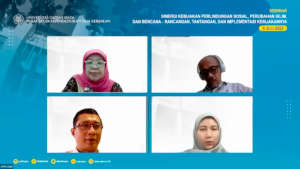
Unifying Mission to Form the Ideal PSA Policy in Indonesia
One of the speakers, Dinar D. Kharisma, Ph.D., from the Directorate of Poverty Reduction and Community Empowerment, Bappenas, said that there are at least five steps needed to strengthen PSA in Indonesia, namely the preparation of regulations and ASP development agendas, ownership development coordination among stakeholders, risk and vulnerability analysis based on valid data and risk mapping, the adaptation of social protection programs according to risk and vulnerability and the development of sustainable financing for program implementation.
Mulyadi Sumarto, PhD., the CPPS UGM researcher, also conveyed the concept of PSA and how the PSA program has been implemented in several countries, such as Africa, Brazil, and the Philippines.
He also explained the concept of PSA and the development of PSA policies in Indonesia. He added that once we study in the Philippines, for instance, the PSA policy has been implemented since the mid-1990s.
“If we (the Indonesians) are just starting this policy by this year, you can estimate this. If this is compared to that of the Philippines, we are not what so-called “left behind”, yeah you know it right? The appropriate term is that there is a gap of more than 25 years,” he added.
Moreover, there is no legal regulation currently in Indonesia regarding PSA, but its implementation refers to the RPJMN, and several PSA practices have also been implemented. “This is unique,” he continued.
You can get to know more about this workshop on the YouTube channel “CPPS UGM” or hit the link below:
Session 1: YouTube CPPS UGM
Session 2: YouTube CPPS UGM
————————————————————–
Writer: Nuraini Ika
Language Editor and Translator: Rinta Alvionita
CPPS UGM – Center for Population and Policy Studies (CPPS) UGM held a book review and discussion titled “From Colonization to Nation State – The Political Demography of Indonesia” written by Dr. Riwanto Tirtosudarmo, M.A.
Taking place online by obeying the health protocols at the Auditorium of CPPS UGM and offline via live streaming on the YouTube channel “CPPS UGM”, the event was attended and viewed by more than 70 participants.
As the reviewer, Sukamdi (senior researcher at CPPS UGM) said that the author has emphasized from the beginning that the book focuses on one of the demographic issues only, namely migration.
“For you who are interested in reading this book, don’t think about finding a detailed discussion outside of migration issues,” Sukamdi said and smiled at the audience.
At the end of the event, Basilica Dyah Putranti (researcher at CPPS UGM) as the moderator of the event presented several notes she concluded from the discussion.
She read some of the notes aloud, such as the next political demography author might be able to look further into the relationship between political demography and the structure of population composition.
“Fertility and motility have not been discussed much yet, have they?” She asked the author to whom he then nodded his head.
She asserted that global-local dynamics have been mentioned a lot in the book “Since this is not finished yet, it might be a good further concern for all of us,” she added.
See full discussion of the book review on the YouTube channel “CPPS UGM”.
CPPS UGM – Center for Population and Policy Studies (CPPS) UGM held a Training on Acceleration Studies in Underdeveloped Regions on 3-5 March 2022 at Auditorium Dr. Agus Dwiyanto, M.P.A., Masri Singarimbun Building, CPPS UGM.
CPPS UGM – Center for Population and Policy Studies (CPPS) UGM held a 2022 working meeting at the Grand Rohan Hotel, Yogyakarta on 27-28 January 2022.
CPPS UGM – Center for Population and Policy Studies (CPPS) UGM held an international online seminar titled “The Dynamics of International Migration during Covid-19 Pandemic: Multiple Perspective”. The Center invited three expert speakers, namely Prof. Aris Ananta (the President of Asian Population Association), Salman Al Farisi (The Ambassador of the Republic of Indonesia in South Africa), and Anis Hidayah (The Head of Center for Research and Migration Studies Migrant CARE). This seminar was guided by the Senior Researcher of CPPS UGM, Dr. Sukamdi. This is part of the Center’s contribution to strengthening transdisciplinary research activities in collaboration with research institutions through Twin Center institution.
See the recording of this seminar at: online seminar
Yogyakarta, CPPS UGM – The case of sexual assault has arisen again in Indonesia. The public has recently been shocked by the news on sexual assault committed by AT (21), the son of a member of the Regional People’s Representative Council in Bekasi, against a minor called PU (15). After being arrested and decided as a suspect, AT said that he will marry the victim because he loves her. The discourse to marry the victim was flatly rejected by D, the victim’s father.
Novi Widyaningrum, a researcher and gender observer at the CPPS UGM, strongly criticized the discourse of the perpetrator to marry the victim. According to her, the discourse of marrying the victim is a form of arrogance based on social class and strong patriarchal culture in Indonesia.
“I’m against it a lot. The victim is only a fifteen-year girl, meaning that she is still a child and thus, it violates the Law on Marriage,” Novi said.
Based on Law No. 16/2019 on Marriage, the minimum age for marriage is 19 years. Marrying the victim whose age is 15 years means doing a forced marriage. In addition to violating the Law on Marriage, this also violates the Law on Child Protection, Human Rights Convention, and Child Rights Convention.
She saw that marrying the victim to the perpetrator means trapping the victim in a lifelong cycle of violence. After getting married, the victim will have a potential to experience multiple forms of violence, such as psychological violence, sexual violence, and it is also possible to experience verbal, physical, and economic violence.
Marrying the victim to the perpetrator also means that the violence is not stopped but is instead legalized through the marriage bond. According to her, the discourse of marrying the victim to the perpetrator since the perpetrator is a close person is also just an imaging and an attempt to avoid legal sanctions for the perpetrator.
“This is a kind of slowly killing the victim. Thankfully, the victim’s parents realized this and rejected the conciliation. The lawyer stated it is an adultery case. This is like a strong example of rape culture and high permissiveness to rape committed by couples. In the end, the solution is conciliation and marriage,” she said.
She added that the ‘mediation’ and ‘conciliation’ attempts made by the community, government institutions, and even the police are evidence that the case of sexual assault is still not seen as a crime, particularly in the case of PU. The perpetrator is the victim’s lover, so such an incident is often considered normal. This way of thinking has a potential to make women more involved in an environment of violence.
Maximum Protection for the Victims & Urgency for Ratification of the Sexual Violence Eradication Bill (RUU PKS)
The case of sexual assault experienced by PU is not the only one that exists in the community, but also the phenomenon of icebergs and things that only raise on the surface that must also occur.
>To protect the victims of sexual assault, Novi explained that there are at least three things that must be performed. First, provide protection and trauma healing to the victims and to ensure that the victims have a safe and comfortable environment so that they can generate self-confidence and live their further life without fear.
“Don’t include the victim in the next cycle of violence, including bullying, because she is also very vulnerable to this kind of actions. People still don’t have much awareness of this kind of case and may take the blame on the victims,” she emphasized.
Second, the perpetrator must be punished according to the law. She has committed multiple crimes. At least there are crimes, i.e., rape, human trafficking, and violence against children. Giving punishment to the perpetrator in accordance with the law will be a good example for the wider community and law enforcement in Indonesia.
Novi also emphasized that the policy makers must strengthen the law enforcement in Indonesia. The laws that are stipulated must be implemented fairly and can be accessed by everyone. “Not because the perpetrator is a person who has political position and power, there attempts to obscure the crime and reduce punishment can be performed,” she exclaimed.
She also added the importance of accelerating the ratification of Sexual Violence Eradication Bill (RUU PKS) which will later become a strong legal basis to protect the victims. It is also emphasized in the RUU PKS that forced marriage is prohibited and is made a criminal act.
Besides, the government must also strengthen some efforts to educate public about violence against women, one of them is to strengthen the education curriculum from primary schools regarding violence prevention and women protection. Respect for women and gender equality must really be emphasized in the world of education.
Another important step to take is to create and share public information on a complaint system that is affordable for women as the victims of violence. The context that the victim is always in a traumatic and weak position (psychologically, socially, and physically) is a major consideration for creating a complaint service that can quickly and accurately be reached by everyone.
Penulis: Nuraini Ika | Editor Bahasa: Rinta Alvionita | Foto: Ilustrasi Kekerasan Seksual Anak (istockphoto)

